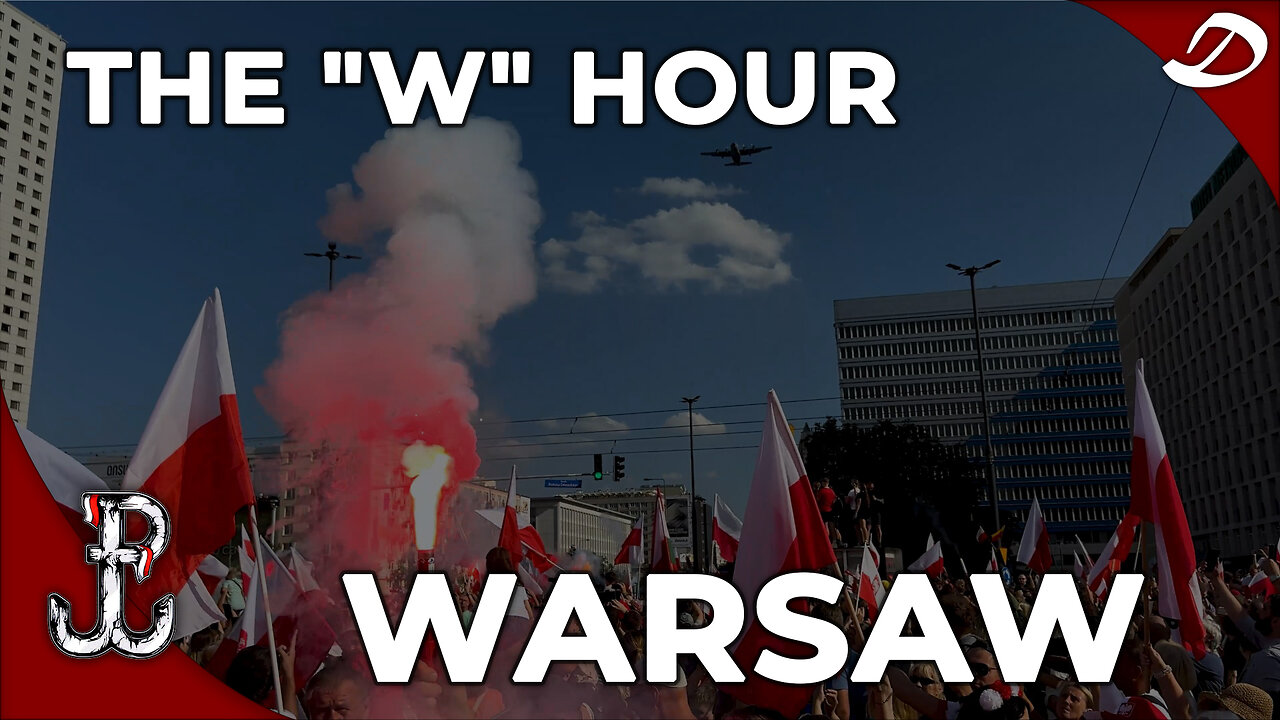Premium Only Content

The "W" Hour / "W" Godzina - 2024
The Warsaw Uprising was a significant World War II operation led by the Polish underground resistance, known as the Home Army (Armia Krajowa), to liberate Warsaw from German occupation. It began on August 1, 1944, and lasted for 63 days, ending on October 2, 1944.
The uprising was timed to coincide with the retreat of German forces from Poland ahead of the Soviet advance. Despite initial successes, the Polish resistance faced overwhelming German counterattacks and a lack of sufficient support from the advancing Soviet forces. The result was a tragic defeat for the Polish resistance, with significant casualties and the near-total destruction of Warsaw.
The impact of the Warsaw Uprising on the city and its people was profound and devastating:
Destruction of the City
Physical Destruction: Approximately 85% of Warsaw was destroyed by the end of the uprising. The Germans systematically demolished buildings, cultural landmarks, and infrastructure in retaliation.
Cultural Loss: Many historical and cultural sites, including libraries, museums, and archives, were lost. This destruction aimed to erase Polish heritage and identity.
Human Cost
Casualties: Around 200,000 Polish civilians and resistance fighters were killed. Many were executed or died due to bombings and harsh conditions.
Displacement: The surviving population was forcibly evacuated. Thousands were sent to concentration camps, labor camps, or displaced across Poland and Germany.
Psychological and Social Impact
Trauma: The brutality of the suppression left deep psychological scars on survivors. Families were torn apart, and the loss of loved ones and homes created lasting grief and trauma.
Resistance Spirit: Despite the defeat, the uprising became a symbol of Polish resistance and determination. It fostered a sense of national pride and unity, even in the face of overwhelming adversity.
Long-term Consequences
Post-War Reconstruction: Rebuilding Warsaw was a monumental task. The city was painstakingly reconstructed, with efforts to restore its historical appearance.
Political Impact: The uprising influenced post-war politics, contributing to the complex relationship between Poland and the Soviet Union. The lack of Soviet support during the uprising left a legacy of mistrust.
The Warsaw Uprising remains a poignant chapter in Polish history, symbolizing both the resilience and the suffering of the Polish people.
Civilians played a crucial role in supporting the resistance during the Warsaw Uprising. Their contributions were diverse and vital to the efforts of the Home Army:
Logistical Support
Supply Lines: Civilians helped establish and maintain supply lines, providing food, medical supplies, and ammunition to resistance fighters.
Shelters: Many residents opened their homes to shelter fighters and provide safe havens for planning and rest.
Medical Assistance
Field Hospitals: Makeshift hospitals were set up in basements and other hidden locations. Civilians, including doctors, nurses, and volunteers, provided medical care to the wounded.
First Aid: Many civilians were trained in basic first aid and helped treat injuries on the front lines.
Communication and Intelligence
Messengers: Young boys and girls, often referred to as “couriers,” carried messages between different resistance units, risking their lives to ensure communication.
Intelligence Gathering: Civilians gathered and relayed information about German troop movements and positions, aiding strategic planning.
Construction and Engineering
Barricades: Civilians helped build barricades and fortifications to protect resistance positions and hinder German advances.
Infrastructure Repairs: They also worked to repair damaged infrastructure, such as water and power lines, to maintain essential services.
Moral and Psychological Support
Community Solidarity: The collective spirit and solidarity of the civilian population boosted the morale of the resistance fighters.
Cultural Activities: Despite the dire circumstances, cultural activities like music, theater, and poetry readings were organized to maintain a sense of normalcy and hope.
Direct Participation
Joining the Fight: Many civilians took up arms and joined the resistance, fighting alongside trained soldiers.
Training and Drills: Some civilians received basic military training to assist in combat and support roles.
The bravery and resilience of Warsaw’s civilians were instrumental in sustaining the uprising, even in the face of overwhelming odds. Their contributions are remembered as a testament to the strength and unity of the Polish people during one of the darkest periods in their history.
-
 6:29
6:29
BIG NEM
21 hours agoCultivating God Mode: Ancient Taoist NoFap Practices
21.2K6 -
 30:53
30:53
Uncommon Sense In Current Times
1 day ago $6.01 earned"Pardon or Peril? How Biden’s Clemency Actions Could Backfire"
42.6K2 -
 40:01
40:01
CarlCrusher
19 hours agoSkinwalker Encounters in the Haunted Canyons of Magic Mesa - ep 4
40.9K2 -
 59:44
59:44
PMG
1 day ago $4.29 earned"BETRAYAL - Johnson's New Spending Bill EXPANDS COVID Plandemic Powers"
50.2K15 -
 6:48:50
6:48:50
Akademiks
17 hours agoKendrick Lamar and SZA disses Drake and BIG AK? HOLD UP! Diddy, Durk, JayZ update. Travis Hunter RUN
172K28 -
 11:45:14
11:45:14
Right Side Broadcasting Network
9 days agoLIVE REPLAY: TPUSA's America Fest Conference: Day Three - 12/21/24
355K28 -
 12:19
12:19
Tundra Tactical
17 hours ago $13.10 earnedDaniel Penny Beats Charges in NYC Subway Killing
72.1K13 -
 29:53
29:53
MYLUNCHBREAK CHANNEL PAGE
1 day agoUnder The Necropolis - Pt 1
161K52 -
 2:00:10
2:00:10
Bare Knuckle Fighting Championship
3 days agoCountdown to BKFC on DAZN HOLLYWOOD & FREE LIVE FIGHTS!
61.8K3 -
 2:53:01
2:53:01
Jewels Jones Live ®
1 day agoA MAGA-NIFICENT YEAR | A Political Rendezvous - Ep. 103
155K39